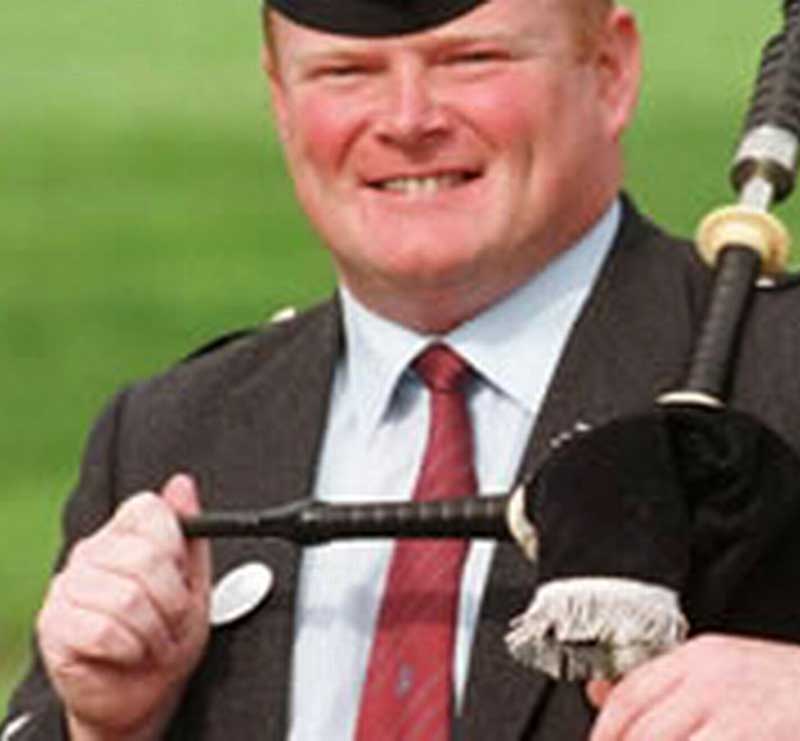By Major (Retd) Bruce Hitchings MBE BEM

Pipe Major Alasdair Gillies was one of the most outstanding pipers of modern times. Born into a piping family in Glasgow in 1963, he first studied the bagpipe with his father, Norman, himself a leading exponent of ceòl beag. In the early 1970s, Alasdair moved with his family from Glasgow to Ullapool where his father had been appointed school’s piping instructor. There his talent blossomed. He quickly won all the junior prizes round the Highland games and then proceeded to jolt a few reputations by occasionally getting in front of the adults in the prize lists, his father included.
I first met Alasdair at the Northern Meeting in Inverness. I had heard of this young schoolboy who had recently beaten his father and John Burgess in a jig competition. I was struck with the pride with which he wore his Queen’s Own Highlanders Cadet uniform and the respect he displayed for Pipe Major Andy Venters who was in charge of the Cadet Pipe Band at the time. While attending Junior Soldiers, Alasdair came under the tutelage of Pipe Major lain Morrison. This proved to be a lifelong pairing with Alasdair travelling over regularly to Lewis for tuition when Iain left the army. This tradition continues with Alasdair’s son, Norrie, also now making the journey across the Minch.
Alasdair joined the 1st Battalion, Queen’s Own Highlanders in Tidworth along with Paul Kellett (also from Ullapool) and David Mackenzie and they immediately fitted in to what was a very strong pipe band. Although already an outstanding piper, Alasdair was shown no favour nor asked any.

Alasdair was deployed to the Suth Atlantic during the Falklands War but a ceasefire was was announced as the regiment was en route. The Regiment was the first to be stationed there after hostilities ceased and the posting lasted six months. Who will ever forget that snowscape image as Alasdair played to the penguins? This was another classic example of Alasdair enjoying playing no matter what the weather conditions and no matter how trained the ear of the listener.
Ireland beckoned. Although on a two year operational tour the regiment made solo piping a priority and allowed six pipers to return home to compete around the games. Always when back in Scotland, Alasdair made the trip north to Ullapool to spend time with his father Norman who would have several sets of pipes ready for Alasdair to pick from. A little know fact is that Alasdair also once played bass drum with a band while in Ireland but thankfully decided to stick with the pipes.
It has to be said the posting to Belize did not suit Alasdair’s complexion nor did the jungle training. He did get through though — but was glad to return to Scotland to compete around the games where the midges were nothing in comparison to the mosquitoes in Belize.
By the time Alasdair attended his Pipe Major’s Course at Edinburgh Castle in 1986 he had already won his first Silver Star at Inverness (this was to eventually be 11). This nine month posting allowed him to further hone his piping skills with no military distractions.
A posting to the Depot at Glencorse, Edinburgh, allowed Alasdair the opportunity to have lessons with retired Director of Army Bagpipe Music, Captain Andrew Pitkeathly. This, allied with the ongoing tuition from Iain Morrison, gave Alasdair the perfect grounding to progress to be a very fine piobaireachd player. Indeed, he went on to win the Gold Medal at Oban in 1989 (and later at Inverness in 2004).
At this time, the Battalion was on exercise in Canada. The call came to cease the exercise and all involved – Tank Regiments, Artillery and Royal Engineers etc – thought that there had been a major incident. The QOHldrs Commanding Officer, Lt Col Seymour Monro, had issued the order and an O Group (executive meeting) was formed at 10.00am. Col Monro informed those present that Cpl Alasdair Gillies had Just won the Gold Medal and asked Cpl Patience who was the Officer Mess Steward to pass around a dram to all gathered. On that day there were a number of people passing forward their black plastic mugs not quite knowing what was going on — but not the Highlanders present. Alasdair was very amused when told of this story.

Next was a posting to Germany and his return to the band as Pipe Sergeant. Not content with taking band practice, playing on band jobs and playing at mess functions Alasdair returned whenever possible to compete around the games and at the major competitions. He was never happier than when he was playing pipes and this was demonstrated by his occasional busking sessions to various European cities. Whether it was the streets of Amsterdam or the boards at Inverness, if Alasdair was playing pipes, he was happy.
I handed over the reins as Pipe Major to Alasdair in 1992 after a very successful North American tour where the band played 74 cities in 86 days. During the tour, in 1991, Alasdair flew home to claim his first Glenfiddich win. On his return, the nightly introduction to the “World Champion Solo Piper” was met with rapturous applause. In his first year as Pipe Major, Alasdair won the Clasp at Inverness. Another piece of history is that Alasdair was the last Pipe Major of the Queen’s Own Highlanders and, on amalgamation, the first of the newly formed Highlanders. Alasdair continued his service and successful solo career but after 17 memorable years he decided to leave the Army and take up the prestigious post of Director of Piping Programme at Carnegie Mellon University, Pittsburgh, USA, where he led the pipe band and successfully established a bagpipe degree course.

Alasdair was a proud Queen’s Own Highlander and the Queen’s Own Highlanders were proud of him. Known as the Family Regiment, I hope that those closest to Alasdair felt the arms of the regiment enveloping them on the news of his passing. On the day of his funeral I had the sad honour of playing Lochaber No More as his coffin, draped in a regimental flag, left the church. As his fellow professional pipers, army colleagues and friends carried him along the road to the cemetery it was to the pipes of Pipe Majors Donald MacKay, Calum Mackenzie and Ian Ruari Finlayson.
On arrival at the cemetery, Pipe Major Mike Gray played Alasdair to the graveside with a beautiful selection of Gaelic airs. As his family and his fellow regimental Pipe Majors lowered Alasdair to his final resting place, Jake Urquhart on bugle sounded the Last Post followed by a minute silence and then Reveille. It was then the turn of Pipe Major Naill Matheson to pay his respects by playing the piobaireachd Cabar Feidh Gu Brath, a fitting tune selected by young Norrie Gillies.
A very dignified way to say goodbye to a son, father, friend and outstanding piper.
• Bruce Hitchings was Pipe Major of the Queen’s Own Highlanders from 1986 to 1992. Now a respected solo piping judge and piping instructor, he is the proprietor of Highland Reeds.
• From the October 2011 Piping Times.


